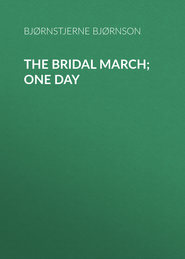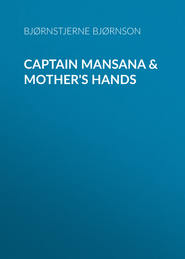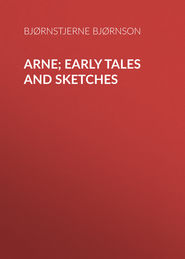По всем вопросам обращайтесь на: info@litportal.ru
(©) 2003-2024.
✖
Magnhild; Dust
Настройки чтения
Размер шрифта
Высота строк
Поля
Magnhild had never viewed her surroundings with critical eyes; she would now laugh heartily with Skarlie over the priest's last sermon, or his indolent life; now over the spider-like activity of the mistress of the house, because it was all described so comically. At the "fat repose" of the governess, even at the "yellow, round heads" of her young friends, Magnhild could now laugh; for the humor with which everything was delineated was so surprisingly original; she did not perceive that this jesting was by degrees undermining the very ground she stood upon.
The quite usual amusement in the country of teasing a young girl about being in love was, meanwhile, directed rather unexpectedly toward Magnhild; she was called "the saddler's wife," because she passed so much time in his society. This reached Skarlie's ears and immediately he too began to call her his "wife," his "tall wife," his "blonde wife," his "very young wife."
The following summer the priest's daughters went to the city for increased opportunities of culture. The governess remained "for the present" at the parsonage.
The saddler came once more in the autumn to complete his work. Magnhild was now, of course, more frequently alone with him than before. He was merrier than ever. One joke that was often repeated by him was about journeying round the world with "his young wife." They met with an immense number of traveling adventures, and they saw many remarkable sights, all of which were so accurately described by Skarlie that they attained the value of actual experiences. But the most ludicrous picture he drew represented the two tramping through the country: Skarlie limping on before with a traveling satchel, Magnhild following in a waterproof cloak and with an umbrella in her hand, grumbling at the heat, dust, and thirst, weary and heartily disgusted with him Then, having reached their journey's end, they rested in Skarlie's little home in the little town, where Magnhild had everything her own way and lived like a princess all the rest of her life.
It would be impossible to describe the countenance of the priest when the saddler appeared in his study one evening, and taking a seat in front of him asked, after a few cordial, pleasant remarks by way of introduction, whether the priest would object to his marrying Magnhild. The priest was lying on the sofa smoking; his pipe dropped from his mouth, his hand sank with it, his fat face relaxed until it resembled a dough-like mass, in which the eyes peeped forth as wholly devoid of thought as two raisins; suddenly he gave a start that set a quantity of springs beneath him to creaking and grating, and the book that lay upside down on his knee fell. The saddler picked up the volume smiling, and turned over the leaves. The priest had risen to his feet.
"What does Magnhild have to say to this?" asked he.
The saddler looked up with a smile.
"Of course I should not have asked if she were not likely to give her consent," said he.
The priest put his pipe in his mouth, and strode up and down the floor, puffing away. Gradually he grew calmer, and without slackening his speed, he observed: —
"To be sure I do not know what is to become of the girl."
Once more the saddler raised his eyes from the book whose leaves he was turning over, and now laying it aside, he remarked: —
"It is, you know, rather a sort of adoption than a marriage. Down yonder at my house she can develop into whatever she pleases."
The priest looked at him, took a puff at his pipe, paced the floor, and puffed again.
"Aye, to be sure! You are, I believe, a wealthy man?"
"Well, if not precisely wealthy, I am sufficiently well provided to get married."
Here Skarlie laughed.
But there was something in his laugh, something which did not quite please the priest. Still less did he like the tone of indifference with which Skarlie seemed to treat the whole affair. Least of all did he like being so taken by surprise.
"I must speak with my wife about this," said he, and groaned. "That I must," he added decidedly, "and with Magnhild," came as an afterthought.
"Certainly," said the other, as he rose to take leave.
A little while later, the priest's wife was sitting where the saddler had sat. Both hands lay idly open on her lap, while her eyes followed her spouse as he steamed back and forth.
"Well, what do you think?" he urged, pausing in front of her.
Receiving no reply, he moved on again.
"He is far too old," she finally said.
"And surely very sly," added the priest, and then pausing again in front of his wife, he whispered: "No one really knows where he comes from, or why he chooses to settle here. He might have a fine workshop in a large city – wealthy, and a smart dog!"
The priest did not use the choicest language in his daily discourse.
"To think she should allow herself to be so beguiled!" whispered the wife.
"Beguiled! Just the word – beguiled!" repeated the priest, snapping his fingers. "Beguiled!" and off he went in a cloud of smoke.
"I am so sorry for her," remarked the wife, and the words were accompanied by a few tears.
This touched the priest, and he said: "See here, mother, we will talk with her, both of us!" then strode heavily on again.
Ere long Magnhild stood within the precincts of the study, wondering what could be wanted of her. The priest was the first to speak: —
"Is it really true, Magnhild, that you have agreed to be the wife of this fellow, the saddler?"
The priest often used the general term "fellow" instead of a proper name.
Magnhild's face became suffused with blushes; in her whole life she could never have been so red before. Both the priest and his wife interpreted this as a confession.
"Why do you not come to us with such things?" asked the priest, in a vexed tone.
"It is very strange you should act so, Magnhild," said the mistress of the house, – and she wept.
Magnhild was simply appalled.
"Do you really mean to have him?" asked the priest, pausing resolutely in front of her.
Now Magnhild had never been accustomed to being addressed in a confidential tone. When questioned thus closely she had not the courage to give a frank statement of all that had occurred between her and Skarlie, telling, how this talk of marriage had commenced as a jest, and that although later she had had a misgiving that it was becoming serious, it was so continually blended anew with jests that she had not given herself the trouble to protest against it. How could she, with the priest standing thus before her, enter on so long a story? And so instead she burst into tears.
Well now, the priest did not mean to torment her. What was done could not be undone. He was very sorry for her, and in the goodness of his heart merely wanted to help her lay a solid foundation to her choice. Skarlie was a man of considerable means, he said, and she a poor girl; she certainly could not expect a better match, so far as that went. True, Skarlie was old; but then he had himself said that he designed rather a sort of adoption than a marriage; his only object was Magnhild's happiness.
But all this was more than Magnhild could bear to listen to, and so she rushed from the room. In the passage she fell to crying as though her heart would break; she was obliged to go up to the dark garret in order to avoid attracting attention, and there her grief gradually assumed definite shape. It was not because the saddler wanted her that she was in such distress; it was because the priest and his wife did not want her.
This was the interpretation she had put on their words.
When the governess was informed of the affair she differed entirely from the mistress of the house, who could not comprehend Magnhild, for the governess could comprehend the young girl perfectly. Skarlie was a man of fine mind and very witty. He was rich, jovial, rather homely, to be sure, but that was not of such great consequence down at the Point. And she adopted this tone in talking with Magnhild when she finally succeeded in getting hold of her. Magnhild was red with weeping, and burst into a fresh flood of tears; yet not a word did she say.
Somewhat curtly the priest now informed the saddler that as the matter was settled he might as well proceed with the preparations. The saddler desired this himself; moreover, he was now quite through with his work. Eagerly as he strove for an opportunity to speak with Magnhild, he even failed to catch a glimpse of her. He was therefore forced to take his departure without having an interview with her.
During the days which followed Magnhild neither appeared in the sitting-room nor at table. No one attempted to seek her and talk with her; the governess deemed it quite natural that in the face of so serious a step the young girl should wish to be alone.
One day the members of the household were surprised by the arrival through the mail of a letter and large package for Magnhild. The letter read as follows: —
In order to complete our delightful joke, dear Magnhild, I came down here. My house has been painted this summer, within and without, a joke which now almost looks like earnest – does it not?
Beds, household furniture, bedding, etc., are articles that I deal in myself, so these I can purchase from my own stores. When I think of the object I have in view, this becomes the most delightful business transaction I have ever entered into.
Do you remember how we laughed the time I took your measure in order to prove accurately how much too short in the waist your dress was, how much too wide across the shoulders, and how much too short in the skirt? Just by chance I took a note of your exact measurement, and according to it I am now having made: —
1 black silk dress (Lyons taffeta).
1 brown (cashmere).











